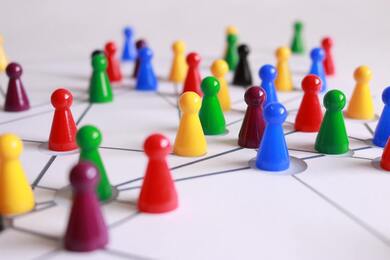Duncan Watts and Steve Strogatz modeled this phenomenon in their 1998 Nature article “Collective dynamics of ‘small-world’ networks.” As one of the 100 most cited papers of all time, it has been used to explain a range of phenomena, from the spread of infectious diseases to how we are all within Six Degrees of Kevin Bacon.
Essentially, the argument is that the world is connected. We are fewer handshakes from every person in the world than we think. Why does this matter from a climate justice standpoint? Because we tend to care more about people the closer they are to us. We are more likely to, for instance, support the GoFundMe of a friend than of a stranger. But closeness also works geographically. Peter Singer’s classic scenario posits you are wearing a brand-new pair of shoes and you see a child drowning in a lake. Most people do not hesitate to jump in and ruin the shoes to save the child, but almost nobody is willing to donate the same amount of money to save a child from malaria in some far-flung country. It even has a name: the identifiable victim effect. It is not a perfect metaphor, but it highlights the value we assign people based on their proximity to us. Our response to climate change is largely about people outside of our immediate network. Rising sea levels will not, for example, impact someone in Ohio as much as someone in Bangladesh, but are these two individuals really that far apart? Climate change is a small-world problem—you cannot put a dome around a country—and as a result, the Ohioan and Bangladeshi are connected through a shared experience; namely, a warmer, more hostile planet with extreme weather events. (Based on a recent study, the Washington Post claimed that “at least 85% of the global population has experienced weather events made worst by climate change”). This matters because shared experiences bring people together—you can relate much more to someone going in for a colonoscopy if you have also had one yourself. Shared experiences create interpersonal bonds, they make us feel more connected, they foster empathy. If we feel closer to one another, theoretically, we may care more about each other—even if they are on the other side of the planet. Nothing about climate change is fair, but we will never develop a cohesive global response if it is framed by guilt or nationalism, finger-pointing or tribalism, in-groups and out-groups, or a me-first mentality. We are citizens of one—albeit large—shared space, one global community. It recalls the bank run scene from It’s a Wonderful Life. At first, the whole town is out for themselves, jostling to get their money out of the bank before somebody beats them to it. Then George Bailey reminds them that their individual investments are interconnected, tied up in a neighbor’s property or a friend’s loan. Only then do they come together for the greater good. They remember that Bedford Falls is not a town of strangers, it is a community of people who care about each other. The climate crisis will not be solved by individuals switching to electric vehicles or recycling more plastic—in Ohio or Bangladesh. It is a socio-economic, geo-political problem that requires a transformation across public policy and business systems. But influential policymakers and businesspeople could take a page from George Bailey and connect the dots between seemingly disconnected people and places. We are more likely to help someone we know, and while the Ohioan may never actually meet the Bangladeshi in this example, they are closer than they think.
1 Comment
|
AuthorColin Gabler is a writer at heart. Archives
May 2024
Categories |

 RSS Feed
RSS Feed